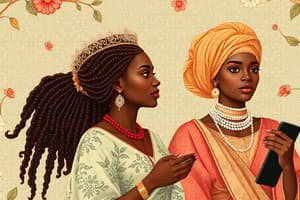Podcast
Questions and Answers
What does 'Age, Race, Class, Sex' refer to in the context of institutionalized fear?
What does 'Age, Race, Class, Sex' refer to in the context of institutionalized fear?
- Promotion of stereotypes
- Institutionalized fear of difference (correct)
- Encouragement of intersectionality
- Acceptance of diversity
What is the lack of intersectionality in the women's movement?
What is the lack of intersectionality in the women's movement?
White women focus upon their oppression as women and ignore differences of race, sexual preference, class, and age.
Black literature is frequently included in women's literature courses.
Black literature is frequently included in women's literature courses.
False (B)
Black women need to be viewed as ______ in our actual complexities.
Black women need to be viewed as ______ in our actual complexities.
Some women only view oppression in terms of gender.
Some women only view oppression in terms of gender.
How is violence against black women perceived in their communities?
How is violence against black women perceived in their communities?
What division exists within the black female community regarding black lesbians?
What division exists within the black female community regarding black lesbians?
What must women do to move beyond the superficial aspect of social change?
What must women do to move beyond the superficial aspect of social change?
It is the responsibility of the ______ to explain to the oppressor how they are being oppressed.
It is the responsibility of the ______ to explain to the oppressor how they are being oppressed.
What was the criticism Margaret Cho had regarding Tilda Swinton's portrayal in 'Dr. Strange'?
What was the criticism Margaret Cho had regarding Tilda Swinton's portrayal in 'Dr. Strange'?
Study Notes
Fundamental Concepts
- "Age, Race, Class, Sex" represents the "institutionalized fear of difference," highlighting societal anxieties surrounding diversity.
Intersectionality Issues
- Lack of intersectionality in the women's movement noted, with white women often concentrating on their gender oppression while overlooking racial, sexual, class, and age differences.
Exclusion of Black Literature
- Literature by women of color is frequently omitted from both women’s literature courses and general literature studies, indicating a systemic disregard for diverse voices.
Complexity of Identity
- Emphasis on recognizing black women as "whole people" with complexities, opposing the reductionist view that confines them to stereotypes.
Gendered View of Oppression
- Some women limit their perception of oppression to gender alone, neglecting crucial factors like race and sexuality, thus undermining a comprehensive understanding of their struggles.
Violence Against Black Women
- Violence within black communities against black women exists but is often overlooked and trivialized, failing to be acknowledged as serious crimes.
Division in Black Communities
- Among black women, there are rifts regarding black lesbians, with some perceiving their sexual orientation as aligning them with "white woman’s issues," leading to further marginalization.
Internalized Oppression
- Importance of identifying and dismantling internalized patterns of oppression is stressed as essential for achieving meaningful social change among women.
Responsibility of the Oppressor
- The expectation that the oppressed need to educate the oppressor about their oppression is challenged, advocating for the oppressor to engage in self-awareness about systemic injustices, as demonstrated in the example involving Tilda Swinton and Margaret Cho regarding representation concerns.
Studying That Suits You
Use AI to generate personalized quizzes and flashcards to suit your learning preferences.
Description
This quiz explores fundamental concepts of intersectionality within the women's movement, emphasizing the importance of recognizing diverse identities and experiences. It examines the systemic exclusion of literature by women of color and discusses how a narrow focus on gender can overlook critical factors like race and sexuality.




